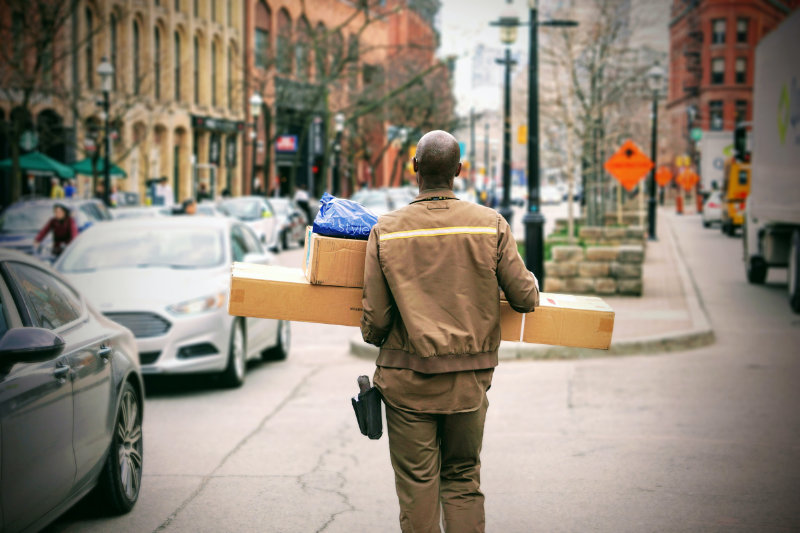Personal data and public space: don't trip on the curb!
Pavements are a key issue in the digitalisation of the world. We need to seize it collectively. Else, others will do it without our knowledge and at the expense of our privacy.
by Charles Foucault-Dumas published on 25 May 2021

Did you realise this? The curb is an interface. We park in front of it, we charge our electric car, we borrow a bike or a self-service scooter, we pick up a rented or shared vehicle, we collect a parcel and our mail, we have dinner delivered there, we are dropped off by bus or by VTC...
All these uses can be monitored from the tool that we have all had in our pockets for the past ten years: the smartphone. The pavement is becoming a real data factory. When is it occupied? When is it free? What does it offer? At what time? This information exists thanks to parking meters, the “real-time” applications of public transport operators, those of Amazon, DHL or Deliveroo delivery drivers, those of taxi drivers or Uber drivers, and those of users of Vélib', ebikes and e-trottinettes... With this data agglomerated, one would be able to know both the needs and the availability of each section of sidewalk… and to measure its value. That are the stakes. They are huge.
This is what urban economics consultant Isabelle Baraud-Serfaty recently explained in the magazine Urbis: “I think we need to realise that pavements are a key resource for many city operators, a resource in limited quantity, and therefore scarce.”
“Dependent on private operators”
A number of companies have understood that the sidewalk itself was a limited resource, and have launched into competition to dominate the business of “curb management”, i.e. the provision of real-time information about sidewalks and their exploitation. “Local authorities must be careful not to become dependent on private operators who map and digitise information on public space”, warns the specialist who is also a lecturer at the Urban School of Sciences Po. Dependencies digital platforms encourage: by aggressively providing their services for free, they lure and lock users into their ecosystem. It is then too late to react.
Before we hit the wall, we need to ask ourselves the right questions. In the future, will we have to pay, directly or through our taxes, for services based on data we collectively generate? Worse, will we one day have to pay for the pavement like we pay for the motorway? Or do we want to decide, also collectively, how and by whom we would like to see this data used in our locality?
This is one of the challenges of HestiaLabs' Mobility project. Do you work for a municipality? Are you interested in the governance of public space data? Let's talk!
Obviously - and this is our trademark - the question of privacy is at the heart of our Mobility data collective. How can we give users maximum added value without compromising their privacy for a second? This is another key issue in this emerging “curb management”.
Our founder Paul-Olivier Dehaye warned about it as soon as in 2019, when Google was conducting its connected city experiment called “Sidewalk” (!) in Toronto.
Funny: I had come to the conclusion that the place to fight is the Curb to the Sidewalk project, not the curb to the literal sidewalk. Meaning: the soon-to-be liminal space to enter G’s domain. But this is already territory where Toronto citizens can fight now cc @biancawylie
— Paul-Olivier Dehaye (@podehaye) June 6, 2019
“Too often, there is a sense of inevitability around data collection in the tech world: that privately owned digital platforms laying claim to your data is the necessary condition for efficiency gains in urban management and design, even though that thinking is entirely manufactured”, wrote Professor Ellen P. Goodman, a specialist in information policy at Rutgers Law School.
In a taxi with Bradley Cooper and Jessica Alba
In 2014, the publication of a dataset by the New York City Taxi and Limousine Commission allowed hackers to demonstrate the weakness of the anonymisation so much emphasised by the platforms. With this data, anonymised, and a simple search for “celebrities in taxis in Manhattan in 2013”, the author of this article was able to reconstruct the journeys of Bradley Cooper and Jessica Alba in the Big Apple's best-known area, find out where they respectively dined and slept, and reveal that neither of them tipped the drivers. He also managed to identify (name, surname, address) a man who used to frequent strip clubs.

This experiment demonstrates that the protection of our privacy is played out at the interfaces: data about me can be anonymised in a system (New York taxis, Google Sidewalks), information external to this system (the place and time of my entry in the taxi or the Toronto neighbourhood digitised by Google) is enough to de-anonymise my data. Do I want a thief, my boss (👋 Paul-Olivier) or an algorithm to know when I'm at home or not and what I do at night? No.
That's why the digitisation of the curb concerns us all. Don’t let Coord and Replica, both spin-offs from Alphabet (Google's parent company), take over our (city) life. Let's try another way.
Join the Mobility project and become an actor in the digitalisation of your mobility and your environment.
Subscribe to our newsletter to follow all our news.